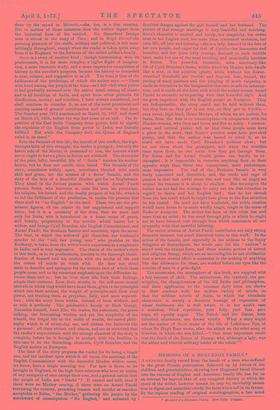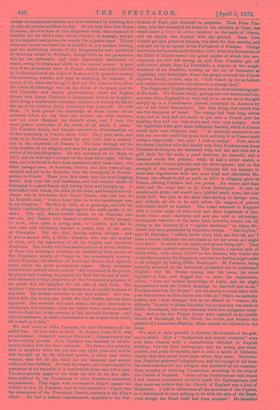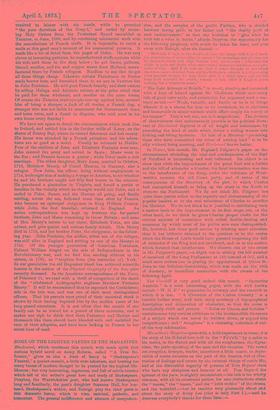MEMOIRS OF A HUGUENOT FAMILY.*
A GENUINE family record from the hands of a man who suffered, in the great French persecution, followed up by letters of his- children and grandchildren, showing how Huguenot blood filtered into the current of English and American family life, has for tus an interest far beyond that of any compiled history in which the- creed of the writer, however honest he may be, inevitably causes, him to digest and assimilate chiefly the facts which tell in its favour. By the copious reading of original autobiographies, a fair mind' * Memoirs of a Huguenoi Famiiy. New York : Putman. strikes an unconscious balance not to be obtained by dwelling first on this set picture and then on that. At the very time that James Fontaine, the true hero of this Huguenot book, was immersed in troubles for his faith's sake, Oliver Plunket, of Armagh, was put to his frightful martyrdom for exactly the opposite cause. Tyburn witnessed scenes too horrid to be detailed in any modern writing, and the shuddering terrors of the Dragonnades were paralleled by shocking scenes in Scotland ; though with us the persecution was far lass systematic, and more impartially distributed all round, owing to hreaks and shifts in the central power. A good idea of the permanent blow to French reason and order inflicted by the Revocation of the Edict of Nantes will be gained in reading this interesting volume, and even in analysing its contents. It was in 1722, when our George L had yet five years to live, when the Great Marlborough was on the brink of the grave, and the Old Chevalier was issuing proclamations about the English throne, that James Fontaine, a Frenchman, settled in England, (and doing a comfortable business), commenced writing his life for the use of his children, being then sixty-four years old. Ile tali them, "I have gained the knowledge of those events which occurred before ray day from my mother, my older brothers, and my Aunt Bougnet, my father's sister, and I have the most perfect conviction of the truth of all which I relate." The Fontaine family had become converts to Protestantism on its first preaching in France, about 1535. They were noble, and John de la Fontaine, born about the year 1500, had a commis- sion in the household of Francis I. He went through all the early troubles of the religion, and was the great-grandfather of the writer of the autobiography. He was murdered at Le Mans in 1563, and his wife and a servant on the same fatal night. Of four sons, one is believed to have been massacred away from home; the three younger ones; of fourteen, twelve, and nine years of age, escaped and got to La Rochelle, then the stronghold of Protest- antism in France. These poor lads came into the town begging bread ; they were fair and handsome, and had evident marks of belonging to a good family and having been well brought up. A shoemaker took James, the elder of the three, and brought him up. James was so handsome that Henri Quatre, who saw him at La Rochelle, said, "Ventre Saint Gris ! he is the handsomest man in my kingdom." He died in 1633, at a great age, and left his family comfortably off ; he always signed the noble prefix to his name. This fair, flaxen-headed James de la Fontaine had one son, also James, who became a minister. Oddly enough, he went, when quite a young man, to London, and fell in love with and ultimately married a young lady of the name of Thompson. But she died, leaving several children ; and it was a second wife, a Mdlle. Chaillou, who was the mother of John, and the ancestress of all the English and American Fontaines. The reader will find careful notices of all the children of these two marriages, involving an interesting little picture of the Protestant society of France in the seventeenth century. James Fontaine, the minister of Vaux and Royan, died eighteen years before the great persecutions began. Many vexations attended his pastoral career, and he "did everything in his power, by prayer and teaching, to prepare his flock for the day of trial," and ultimately a large proportion of the Protestant population of his parish fled the kingdom for the sake of their faith. The minister "was never seen in the transaction of worldly business of any kind. My mother attended to all such matters. She con- sulted with him in any case where she had doubts, but she alone appeared. She received and paid money, she gave directions to workpeople and servants; thus my father never came in contact with his flock but in the exercise of his spiritual functions ; and this circumstance, no doubt, contributed to the respect with which all looked up to him."
We now come to John Fontaine, the last Frenchman of the exiled line. He was born in 1658. In France, Louis XIV. was an adolescent; Cromwell ruled at Whitehall ; Massachusetts was in her earliest growth. John Fontaine was destined to be inti- mately linked with the three countries. His father, the minister, died of apoplexy when the by was only eight years old, and he was brought up by his widowed mother, a strict and tender woman, who did all she could for the temporal and eternal welfare of her children. Ile took his degree, and found himself in _ possession at his majority of a comfortable house and 440 a year. The next seventy pages of the book are full of the dire afilic- tiOnS suffered by the Protestants of John Fontaine's immediate acquaintance. They began with a complaint lodged against his brother-in-law, M. Forestier, that he had received a "Papist into the communion of the Protestant Church, contrary to the King's edicts." He had a tedious imprisonment, appealed to the Par- liament of Paris, and obtained an acquittal. Then Peter Fon- taine, who had succeeded his father in the ministry at Van; was seized under a let/re de cachet, confined in the castle of Oleron, and his church was levelled with the ground. Then John himself got into prison at Salutes, was there for four months, and only got out by an appeal to the Parliament of Guienne. Things went from bad to worse until October, 1685, when the Revocation of the Edict of Nantes caused the great exodus of which the con- sequences are still felt among us, and John Fontaine got off with eleven others from La Tremblade, a seaport in the neigh- bourhood of La Rochelle, landing on the 1st of December at Appledore, near Barnstaple, where the people received the French fugitives kindly, so that, says he, "God raised up for us fathers and mothers and brothers and sisters in a strange land."
The Huguenots' English experiences are the most interesting part of the book. We breathe freely, getting into our accustomed air, and that olden England is so very real to us, as we see it brought sharply up in a Frenchman's journal, translated in America by one of his lineal descendants. The first thing that struck him was the cheapness of bread. The voyage had been long, eleven days, and as they had not dared to put into a French port for supplies, they had run very short, and were very hungry. And the Appledore folks gave them halfpenny biscuits, which in France would have cost twopence each. "It instantly occurred to me that any one who could buy grain here and ship it to Fromm must realise a large profit ; but, alas ! I had no money." Now, one of the eleven fugitives who had landed with John Fontaine was Anne Elizabeth Boursiquot, his betrothed wife, and she had with her a gold chain for the neck, a pearl necklace, an emerald, and a diamond worth five pistoles ; while he had a silver watch, a rose diamond, twenty pistoles, and six silver epoons ; and on the strength of this rescued property Fontaine did not hesitate to enter into negotiations with one most kind and charitable Mr. Donne, who offered to risk as much as 4300 in shipping grain to France, offering Fontaine half the profits. No smiler said than done, and the cargo sent to M. Peter Boursiquot. It sold at considerable profit, and would have yielded much more, but that Louis XIV. was just at the same time dealing in foreign corn, and ordered all his to be sold before the cargoes of private individuals could be touched. The vessel returned to England with a return cargo of nine tons and three hogsheads of Bor- deaux wine ; some chestnuts and salt also sold to advantage. Subsequent ventures of the same kind, however, turned out ill, owing to the knavery of a "regular merchant" to whom Mr. Donne had been persuaded by friends to consign. "The English," says M. Fontaine, "seldom know when they are well off, and I from a foolish diffidence did not stand up for my cousin as I might have done." It ended in the watch and spoons being sold. Then comes a quaint episode concerning Miss Donne, a maiden lady of thirty-three, with about 13,000 to her fortune, who thinks she would like to marry the Huguenot, and that her brother might make it all straight by taking Mdlle. Boursiquot. M. Fontaine, being tenderly attached to his betrothed, pretended not to understand English ; but Mr. Donne coming into the room, his sister appealed to him, and begged him to make the explanation, which, from our mutual knowledge of Latin, and his slight acquaintance with the French language he was well able to do." Fontaine says that Mr. Donne" was not nearly so much taken with your dear mother as Miss Donne was with me," which, he modestly admits, was "most strange," but as he offered to "remove the difficulty "in order to please his sister, the proposition was made to Mdlle. Boursiquot, who very naturally burst into indignant weep- ing. And so the two French lovers were married at the parish church of Barnstaple by Mr. Wood, the rector, and became the parents of a numerous offspring, whose careers are followed in the book.
We wish it were possible to describe the fortunes of the pair, and in detail. How a "feather-bed and several °overlays " were sent from France, with a characteristic disbelief in English bedding ; how the kind townspeople sent the young pair meat, poultry, and grain for months, and in such a spirit of Christian charity that they never knew from whom they came. Neverthe- less, Fontaine preferred independence, and the remit of aid from the fund collected for the refugees was hindered by his conscien- tious scruples at receiving Communion according to the.rites of the Church of England. "Some of the Presbyterians with whom I had become acquainted actually hated the Episcopalians, and they made me believe that the Church of England was a kind of Romanism. I held in abhorrence all the practiees of the Papiete, so I determined to have nothing to do with the akin of the Beast, even though the Beast itself had been rejected." lie therefore
resolved to labour with his hands, while he preached "the pure doctrines of the Gospel," and ended by receiv- ing Holy Orders from the Protestant Synod assembled at Taunton, in Jane, 1688, and by combining ministerial work with the manufacture of French stuffs. It is impossible to resist a smile at this good man's account of his commercial prowess. It reads like a bit of detail from the pages of Defoe. He was very clever at inventing patterns, he manufactured stuffs upstairs while his wife sold them in the shop below ; he got linens, galloons, thread, needles, and tin and copper wares from Holland, manu- factured there by French refugees. Needless to say that he got all these things cheap. Likewise certain Frenchmen in Exeter made beaver hats, and furnished them to no one in Taunton but to John Fontaine. He sold pure French brandy, and drew custom by selling Malaga and Alicante raisins, at the price retail that he paid for them wholesale, and needles on the same terms. Of course the Taunton tradespeople rose up against him, accused him of being a sharper, a Jack of all trades, a French dog, a stranger who was not liable to assessment for Government taxes and town rates, and a Jesuit in disguise, who said mass in his own house every Sunday !
We have not space to detail the circumstances which took. him to Ireland, and settled him in the further wilds of Kerry, on the shores of Bantry Bay, where he turned fisherman and lost money. His house was attacked by a French privateer, and his adven- tures are as good as a novel. Finally he returned to Dublin. Four of the children of John and Elizabeth Fontaine were sons, John entered the army and served in Spain ; Moses went to the Bar ; and Francis became a pastor ; while Peter made a rich marriage. The eldest daughter, Mary Anne, married in October, 1716, Matthew Maury, of Castel Mauron, in Gascony, also a refugee. Now John, the officer, being without employment in 1714, bethought him of making a voyage to America. to see whether he and his brothers might not fitly find homes in the colonies. He purchased a plantation in Virginia, and found a parish or benefice in the vicinity which he thought would suit Peter, and it ended in Peter, James, and the Maurys all going, and finally settling, across the sea, followed some time after by Francis, who became an episcopal clergyman in King William County, while John, the first traveller, returned to England. An active correspondence was kept up between the far-parted brothers, John and Moses remaining in Great Britain ; and some of Mrs. Maury's letters to her sister, Elizabeth Torin, are also extant, and give quaint and curious family details. Mrs. Maury died in 1755, and her brother Peter, the clergyman, in the follow- ing year. John Fontaine, the soldier, eldest son of the refugee, was still alive in England and writing to one of the Maurys in 1764. Of the younger generation of American Fontaines, Colonel William fought on the aide of Independence in the Revolutionary war, and we find him sending ribbons to his sisters, in 1781, as "trophies from (the surrender of) York." In our generation the old Huguenot blood has achieved scientific honour in the author of the Physical Geography of the Sea, quite recently deceased. In the American correspondence of the Times, of February 21, we read with a thrill of recognition of the death of the "celebrated hydrographic engineer Matthew Fontaine Maury." It will be remembered that he espoused the Confederate side in the late war, and was one of their most distinguished officers. That his parents were proud of their ancestral stock is shown by their having baptised him by the maiden name of his long-passed ancestress. It is not often that the annals of one family can be so traced for a period of three centuries, and it makes one sigh to think that these Fontaines and Maurys and thousands like them should have blended with and enriched the race of their adoption, and have been lacking to France in her sorest hour of need.




































 Previous page
Previous page